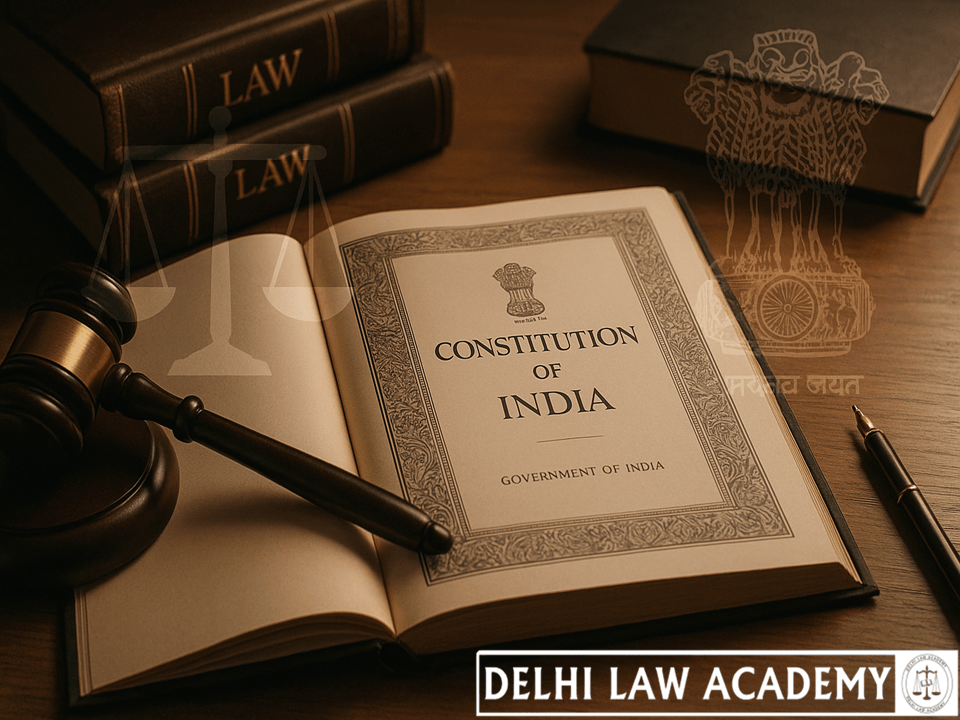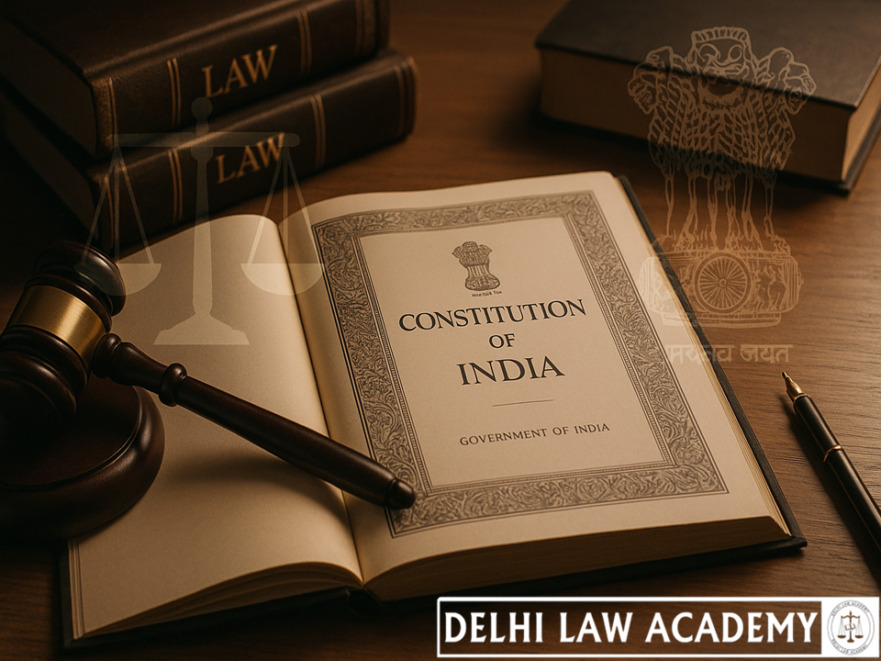
🚚 TRADE, COMMERCE & INTERCOURSE • SERVICES UNDER UNION & STATES
Articles 301 – 312
📌 TOPICS
- Freedom of trade, commerce & intercourse
- Recruitment and conditions of service
- Safeguards for civil servants
- All-India services
Delhi Law Academy Jaipur presents below for aspirants of RJS, DJS, PCS (J) and other Judicial Services throughout India
a simplified Note on the Constitutional provisions relating to trade and commerce and services under the Union and the States.
📜 Constitutional Provisions
🚚 Article 301 – Freedom of trade, commerce & intercourse
o trade, commerce and intercourse
o shall be free throughout India
⚖️ Article 302 – Restrictions by Parliament
o impose restrictions on freedom of trade, commerce and intercourse
o in public interest
🚫 Article 303 – Restrictions on restrictive powers
o to make any law
▪ giving preference to one State over another or
▪ making discrimination between States
o on any entry of trade and commerce in any List
• However, Parliament shall have power
o of making such law
▪ giving preference or making discrimination
o if it is necessary to do so
▪ for dealing with scarcity of goods in any part of India
📦 Article 304 – Restrictions by State Legislatures
o on goods imported from other States
o any tax
o to which similar goods manufactured or produced in that State are subject
• However, there shall be no discrimination
o between goods so imported and
o goods so manufactured or produced
• A State Legislature may impose reasonable restrictions
o on freedom of trade, commerce and intercourse within that State
o in public interest
• A bill for this purpose shall be introduced
o only with previous sanction of President
⚖️ Important Case Law
- Automobile Transport (Rajasthan) v. State of Rajasthan [1962 SC]
- Jindal Stainless Ltd v. State of Haryana [2006 SC]
- Video Electronics Pvt. Ltd. v. State of Punjab [1990 SC]
- Shri Mahavir Oil Mills v. State of J&K [1996 SC]
🏛️ Article 307 – Appointment of authority
o appoint an appropriate authority
o for carrying out purposes of articles 301, 302, 303 and 304
🧑⚖️ SERVICES UNDER UNION & STATES
Article 308
o Jammu and Kashmir
📋 Article 309 – Recruitment & Service Conditions
• Acts of Parliament regulate recruitment & service conditions
• Till Parliament makes law: President may frame rules
States:
• State Legislatures regulate recruitment & service conditions
• Till then: Governor may frame rules
⏳ Article 310 – Tenure of office
→ hold office during pleasure of President
• Civil service of a State
→ holds office during pleasure of Governor
🛡️ Article 311 – Safeguards for civil servants
• Cannot be dismissed/removed by authority subordinate to appointing authority
Second safeguard: Inquiry
• Must be informed of charges
• Must get reasonable opportunity of being heard
Inquiry NOT necessary when:
• Conviction on criminal charge
• Not reasonably practicable to hold inquiry (written reasons required)
• Security of State involved
🇮🇳 Article 312 – All-India Services
• Parliament may create such services
IAS & IPS deemed created under this Article
📘 Stay Ahead with Delhi Law Academy!
Get access to free monthly current affairs, read our insightful blogs,
and explore free study resources prepared by experts at DLA Jaipur. 🚀
Frequently Asked Questions (FAQs)
This means goods and economic activity can move across States without barriers unless specifically allowed by the Constitution.
However, they cannot discriminate between local and imported goods. Any restrictive Bill requires prior Presidential sanction.
compensatory taxes and regulatory measures do not violate Article 301 if they facilitate trade rather than restrict it.
- A civil servant cannot be dismissed by a subordinate authority.
- They cannot be dismissed, removed or reduced in rank without an inquiry, unless exceptions apply such as conviction or security concerns.
Until such laws are made, the President (for Union) and the Governor (for States) may frame rules.
Parliament then enacts a law to create such services. IAS and IPS are deemed to have been created under Article 312.
Contact us
📍 Delhi Law Academy – Jaipur Branch
6C, Tower 2, Coaching Hub, Pratap Nagar, Jaipur – 302033
📞 Phone:
+91 9911916552
+91 8447285606
✉️ Email:
contactus@delhilawacademy.com

